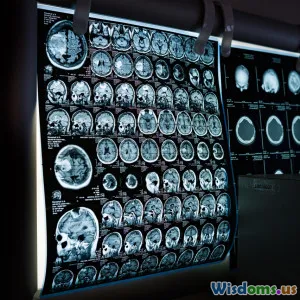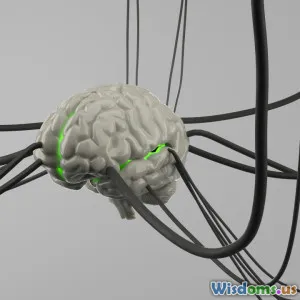
Exploring the Brain Science of Gut Instincts Fact vs Fiction
9 min read Unravel the science of gut instincts by separating fact from fiction and discovering the brain-gut connection shaping intuition. (0 Reviews)
Exploring the Brain Science of Gut Instincts: Fact vs Fiction
Have you ever made a split-second decision based on a feeling deep in your stomach and later marveled at how right it was? We call these moments "gut instincts"—intuitive hunches that often defy logic but sometimes lead us in the right direction. But what exactly happens inside our bodies when we experience that "gut feeling"? Is it just a figure of speech, or is there solid science behind it? In this article, we’ll explore the fascinating brain science behind gut instincts, decipher fact from fiction, and understand how this complex bodily communication influences our intuition and emotional life.
The Roots of "Gut Feeling": More Than Just a Metaphor
The phrase "gut feeling" is deeply ingrained in everyday language — a nearly universal way to describe intuition. That visceral sense of instant knowing hints at a profound connection between our brain and our digestive system.
Anatomy of the Gut-Brain Axis
Contrary to the idea that feelings only arise in the brain, our gastrointestinal tract is often called the "second brain" due to its vast network of neurons embedded in the gut wall — collectively named the enteric nervous system (ENS). The ENS contains approximately 100 million neurons, more than the spinal cord, and operates semi-autonomously.
The brain and gut communicate constantly via several conduits:
- Vagus nerve: The longest cranial nerve, acting as a bi-directional communication highway between the brainstem and the ENS.
- Neurotransmitters: The gut produces key neurotransmitters like serotonin, with about 90% of the body’s serotonin residing in the gut.
- Immune and endocrine signaling: The gut bacteria modulate immune responses and secrete hormones that impact mood and cognition.
This elaborate network forms what scientists call the gut-brain axis — a bi-directional communication system influencing digestion, mood, decision-making, and even perception of pain.
Practical Example: How Stress Affects Digestion
Ever felt a "knot in your stomach" before public speaking or a job interview? That’s stress signaling traveling from the brain to the gut, altering motility and secretion. This illustrates how tightly linked the gut and brain are — the ENS is sensitive and responsive to psychological states.
Gut Instincts in Decision-Making: Myth or Reality?
The Science of Intuition
Intuition is often defined as rapid, unconscious processing of past experiences and environmental cues enabling quick judgments without deliberate analysis. Studies suggest that gut feelings tap into this unconscious processing, involving both brain and gut signals.
A landmark study by Bechara et al. (1997), involving patients with damage to areas of the brain responsible for emotional processing, showed that these individuals struggled to make advantageous decisions despite having intact intellectual reasoning. Researchers specifically looked at skin conductance responses (a marker of autonomic nervous activity) which precede conscious awareness of decision-making. These "somatic markers" pointed to early bodily signals aiding intuition.
Vagus Nerve and Heart Rate Variability as Intuition Biomarkers
Scientists have explored physiological markers correlated with intuitive accuracy:
- Vagus nerve activity: Higher vagal tone (measured via heart rate variability) is associated with better emotional regulation and decision-making.
- Gut microbiota: Emerging research suggests diverse gut flora may influence mood and cognitive functions, potentially influencing gut-based intuition.
Real-World Insight: Firefighters, Soldiers, and Intuition
Experienced professionals like firefighters and military personnel often rely on gut instincts. Their expertise allows fast pattern recognition integrated with bodily signals — an embodied form of knowledge shaped by training and experience. Psychiatrist Daniel Goleman notes in "Emotional Intelligence" that intuition is not mystical, but a form of expertise deeply embodied over time.
Debunking Common Misconceptions
While there is truth to the gut-brain axis, not all popular beliefs about gut instincts withstand scientific scrutiny.
Fiction: Gut Instincts Are Always Reliable
Our intuitive feelings are not infallible. Cognitive biases, emotional states, and misinformation can distort gut feelings. For example, anxiety might trigger gut discomfort misleadingly appearing as intuition.
Fiction: The Gut Thinks Independently From the Brain
While the ENS is semi-autonomous, it does not possess consciousness or independent thought—it works in tandem with the brain. The "second brain" is better understood as an extensive neural network managing digestion and signaling feelings rather than rational thought.
Fiction: Gut Feelings Are Mystical Psychic Phenomena
The psychology of intuition relies on pattern recognition and unconscious information processing rather than extrasensory perception or supernatural insight.
How to Harness Your Gut Instincts Wisely
Understanding how your brain and gut interact can help you better tune into your intuition and avoid pitfalls.
Mindfulness and Body Awareness
Practicing mindfulness encourages better detection of subtle bodily signals underlying intuitive feelings. Regular meditation or focused breathing improves neural connections facilitating gut-brain communication.
Nutrition and Gut Health
Because gut bacteria influence neurotransmitter production, a balanced diet rich in fiber, fermented foods, and prebiotics supports a healthy microbiome, which may enhance emotional and cognitive resilience.
Reflective Practice
Taking moments to reflect on past decisions that relied on intuition can build awareness of when gut feelings serve you and when they might mislead.
Consulting Both Intuition and Logic
The best decisions often arise by combining intuitive impressions with rational analysis—a balanced approach acknowledged by cognitive scientists.
Conclusion: The Science-Based Understanding of Gut Instincts
Far from mere metaphor, gut instincts embody a complex interplay between the brain and the enteric nervous system. Our gut-brain axis continually exchanges information shaping emotions, decision-making, and intuition. While our "second brain" sends meaningful bodily signals contributing to rapid judgments, intuition is ultimately a product of embodied learning, neural pathways, and unconscious cognition rather than mystical forces.
By appreciating the scientific foundations of gut feelings, we gain a nuanced perspective that can improve self-awareness, decision-making, and emotional health. So next time you experience that "feeling in your gut," remember it's an intricate dialogue between your brain, your stomach, and your life experiences — an ancient wisdom encoded in modern science.
References
- Bechara, A., Damasio, H., & Damasio, A. R. (1997). "Deciding advantageously before knowing the advantageous strategy." Science, 275(5304), 1293-1295.
- Mayer, E. A. (2011). "Gut feelings: the emerging biology of gut–brain communication." Nature Reviews Neuroscience, 12(8), 453-466.
- Goleman, D. (1995). Emotional Intelligence: Why It Can Matter More Than IQ. Bantam.
- Cryan, J. F., & Dinan, T. G. (2012). "Mind-altering microorganisms: the impact of the gut microbiota on brain and behaviour." Nature Reviews Neuroscience, 13(10), 701-712.
Rate the Post
User Reviews
Popular Posts



















